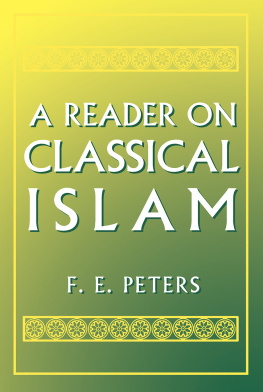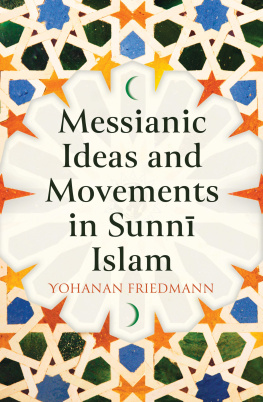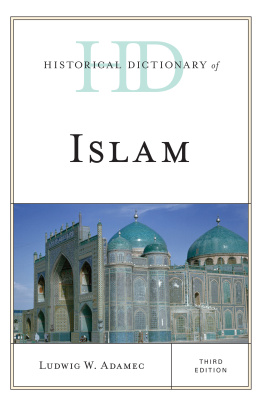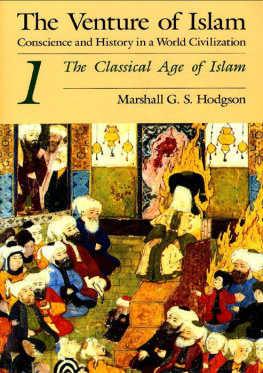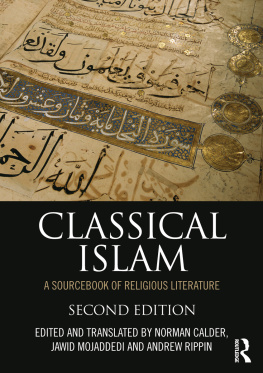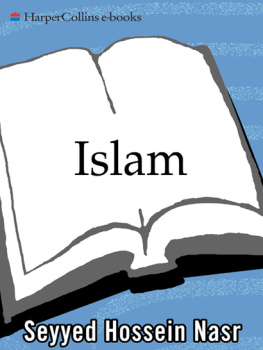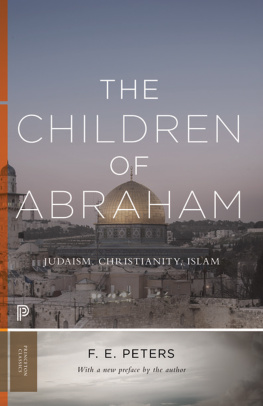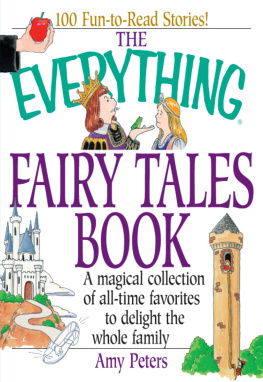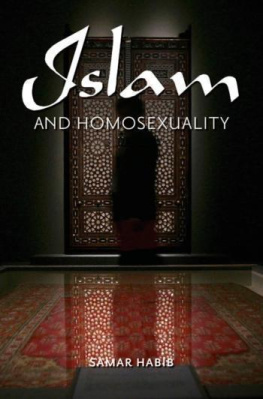Peters F. E - A Reader on Classical Islam
Here you can read online Peters F. E - A Reader on Classical Islam full text of the book (entire story) in english for free. Download pdf and epub, get meaning, cover and reviews about this ebook. year: 2013, publisher: Princeton University Press, genre: Religion. Description of the work, (preface) as well as reviews are available. Best literature library LitArk.com created for fans of good reading and offers a wide selection of genres:
Romance novel
Science fiction
Adventure
Detective
Science
History
Home and family
Prose
Art
Politics
Computer
Non-fiction
Religion
Business
Children
Humor
Choose a favorite category and find really read worthwhile books. Enjoy immersion in the world of imagination, feel the emotions of the characters or learn something new for yourself, make an fascinating discovery.
- Book:A Reader on Classical Islam
- Author:
- Publisher:Princeton University Press
- Genre:
- Year:2013
- Rating:3 / 5
- Favourites:Add to favourites
- Your mark:
- 60
- 1
- 2
- 3
- 4
- 5
A Reader on Classical Islam: summary, description and annotation
We offer to read an annotation, description, summary or preface (depends on what the author of the book "A Reader on Classical Islam" wrote himself). If you haven't found the necessary information about the book — write in the comments, we will try to find it.
A Reader on Classical Islam — read online for free the complete book (whole text) full work
Below is the text of the book, divided by pages. System saving the place of the last page read, allows you to conveniently read the book "A Reader on Classical Islam" online for free, without having to search again every time where you left off. Put a bookmark, and you can go to the page where you finished reading at any time.
Font size:
Interval:
Bookmark:

A Reader on Classical Islam
A READER ON CLASSICAL ISLAM
F. E. PETERS
Princeton University Press
Princeton, New Jersey
Copyright 1994 by Princeton University Press
Published by Princeton University Press, 41 William Street, Princeton, New Jersey 08540
In the United Kingdom: Princeton University Press, Chichester, West Sussex
All Rights Reserved
Library of Congress Cataloging-in-Publication Data
A Reader on classical Islam / F. E. Peters.
p. cm.
Selections almost all of them originally in ArabicPref.
Includes bibliographical references (p.) and index.
eISBN 1-4008-0618-6
1. Islam. I. Peters, F. E. (Francis E.)
BP161.2.R43 1993 93-14595
297dc20
This book has been composed in Adobe Perpetua
For
Eamon and Carol Brennan,
with great affection
CHAPTER 1
The Past, Sacred and Profane
CHAPTER 2
The Life and Work of the Prophet
CHAPTER 3
The Community of Muslims
CHAPTER 4
The Word of God and Its Understanding
CHAPTER 5
The Quran, the Prophet, and the Law
CHAPTER 6
The Worship of God
CHAPTER 7
Saints and Mystics
CHAPTER 8
Islamic Theology
Islam is a word we can understand whether we are Muslims or not. It means submission, and, more specifically in the context where it first and most familiarly appears, submission to the will of God. That context is the Quran, the Sacred Book of the Muslims, those who have submitted. We do not use the word so simply, however. It has been built into an abstract cathedral of connotation, on the same scale and grandeur as Christianity and Judaism. This larger significance of the term is of our own making, of course, derived from whatever else we can read out of the rich pages of the Quran or, more broadly, what we can glean from the writings or observe in the deeds of those who acknowledge themselves as submitters.
This book is designed to enable the reader to shape, or perhaps reshape, the design and dimensions of his or her understanding of that larger Islam by presenting a substantial body of literary evidence on what both the Quran and Muslims understood by that term and its context. For all its broadness, the evidence is limited, however. It is constituted of words rather than deeds, and words derived from the highest of high literary traditions. What follows are the thoughts of professors, lawyers, and littrateurs, Muslims all, and masters of the pen as well as of the spiritual life. Popular religion or the actual behavior of actual Muslims is not part of the portrait. Indeed, not a great deal is known of such things, not, at any rate, for the period under consideration here, what I have chosen to call Classical Islam.
Classic or classical period is likewise a construct, all the more obviously so since it is being borrowed from one phenomenon, Greek and Roman antiquity, and used to somehow periodize another quite different one, Islam. Muslim historians do not much engage in such categorizations, and if one were to look to them for a Classical Islam, or an Age of the Fathers, it would likely embrace a far shorter interval than what is understood here, the generation of Muhammads own contemporaries, those revered Companions of the Prophet, or, somewhat more generously, the sub-Apostolic age of the first four rulers of the Muslim community, the so-called Rightly Directed Caliphs (632750 C.E.). The emphasis on such notions is itself a rather recent phenomenon in Islamic circles. The harking back to a more authentic era of belief and practice is obviously a function of a sense of decline, of moral nostalgia, when agents of renewal or reform search the past for a model for the present troubled times.
That is not the immediate concern here, however. Classical is understood in both a broader and a more restricted sense. It refers primarily to religious literature and to Islam as a religious society, but it does not reflect on the political or social or economic rise and decline of that society. It means most simply the era when the classics of Islamic law and spirituality were written, works of such universally acknowledged importance that subsequent generations of Muslims understood themselves as successors and assumed scholasticisms unmistakably characteristic posture of casting their own meditations on Islam in the form of commentaries or glosses on the works of the masters. Concretely, the selections presented here, almost all of them originally in Arabic, the classical language of Islam, extend from the early seventh-century Quran to about 1400 C.E. After a brief look at the Muslims own regard for their pagan, pre-Islamic past (), the selections are arranged topically, and, in the manner of the writers themselves, with only very rapid glances at the political history of the community.
Before entering the somewhat dense body of texts, we begin with a rapid overview of the forms and modalities of Classical Islam.
A Reader on Classical Islam
Islam was not founded by Muhammad (ca. 570632 C.E.); on the Muslim view, it is better understood as part of Gods merciful providence, present from all eternity but revealed at various moments in history through the agency of His Chosen Prophets. Muhammad was one of these latter, a mere man singled out by Godthe divine name in Arabic, Allah, may obscure the fact that this is in truth the same universal God who spoke to Abraham, Moses, and Jesusto communicate His final message to His creation. These revealed messages, warnings, and signs for all mankind were communicated verbatim and in Arabic to Muhammad over the course of some twenty-two years and are collectively called in Arabic al-Quran or The Recitation. The Quran was recognized by Muhammads scant body of followers as divinely inspired even as it was being delivered, though its codification into a single book divided into 114 chapters (suras) may have taken place only after Muhammads death. And there will be no more: the Book is closed; Muhammad was the Seal of the Prophets.
The essence of the message is simple. It is a warning to submit (aslama, whence the noun submission, islam) to the will of God, to recognize the rights of the Creator over His creatures. For him who does submit, the muslim, there awaits eternal reward in Paradise; for the disbeliever or infidel (kafir), eternal damnation in Hell. The Muslims outward sign of submission is a formula of witnessing (shahada) that has become the profession of faith in Islam: There is no God but The God, and Muhammad is His Messenger. There flow from this declaration of heart and tongue four other primary obligations for all Muslims:
1. prayer (salat) said five times daily at the canonically appointed hours, with the noon prayer on Friday to be said in common. This is usually done in a mosque (masjid, jami), a building that in form and function is little more than the Arabic name implies, an assembly hall, with a niche (mihrab) to mark the orientation (qibla) toward Mecca, and a minaret or tower from which the faithful are summoned to prayer at the appointed hours;
2. the payment of alms in the form of a tithe (zakat);
3. fasting and other abstentions during the lunar month of Ramadan;
4. and, if practical, at least one pilgrimage (hajj) to Gods House, a cubelike building (kaba) set down in a sacred precinct (haram) in the heart of Muhammads native Mecca in Western Arabia.
Next pageFont size:
Interval:
Bookmark:
Similar books «A Reader on Classical Islam»
Look at similar books to A Reader on Classical Islam. We have selected literature similar in name and meaning in the hope of providing readers with more options to find new, interesting, not yet read works.
Discussion, reviews of the book A Reader on Classical Islam and just readers' own opinions. Leave your comments, write what you think about the work, its meaning or the main characters. Specify what exactly you liked and what you didn't like, and why you think so.

